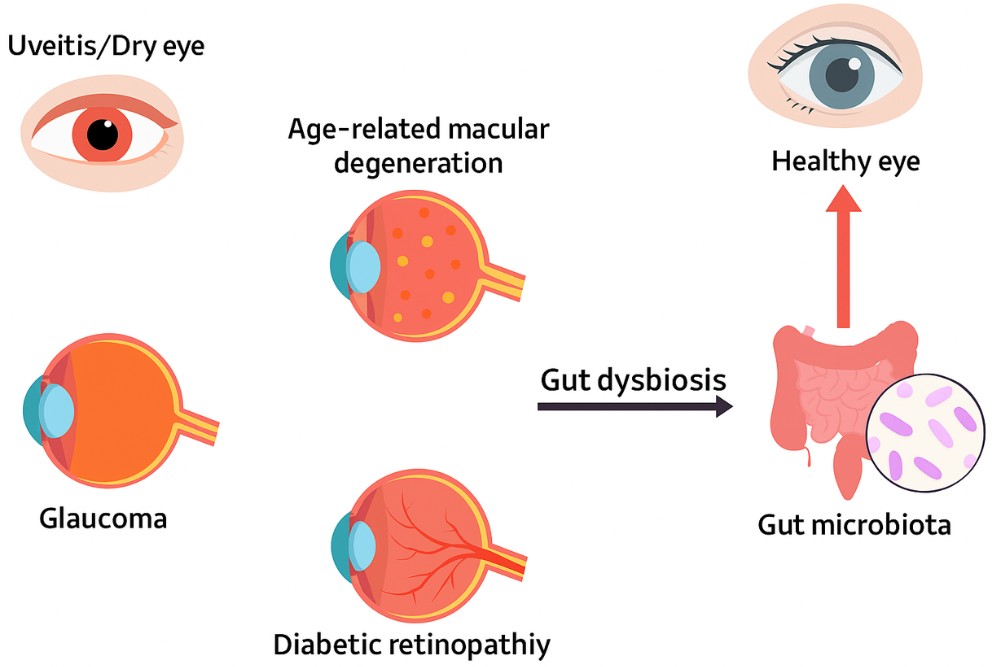Though it isn’t well-known, the gut-vision axis is an exciting new concept. It describes how your gut health, including the microbiome and digestion, influences your eyes. Some evidence even shows links between poor gut health and severe eye issues and conditions. So, yes, it is real.
Of course, your digestive system isn’t the only area related to vision problems. The brain may also affect your eyes, particularly if you’re dealing with a neurological disease. Some conditions, including stroke, Multiple Sclerosis, cancer, or autoimmune disorders, result in blurring, double vision, pain, and other symptoms. For more information on how your gut and eyes are connected, keep reading.

Gut-Vision Axis
The gut microbiome is home to a hundred trillion organisms, creating a unique ecosystem. This mixture of bacteria, fungi, yeast, and other microorganisms affects the body in several ways. One unexpected link is to the eyes, causing various issues, which we’ll discuss in the following sections.
Inflammation
Various factors influence eye health, including age, environment, corrective lenses, and the use of eye drops. However, recent evidence shows the gut-vision axis also contributes to vision problems, including inflammation.
According to experts, the gut produces several anti-inflammatory bacteria. Poor gut health causes dysbiosis, altering the delicate microorganisms in the gut microbiome. Disruptions frequently reduce anti-inflammatories while increasing pro-inflammatory bacteria. Such imbalances could lead to eye inflammation, optic nerve damage, and eye disease.
Poor nutrient absorption
Experts agree that proper nutrition is essential for healthy eyes. In fact, zinc, thiamine, folate, and various vitamins maintain vision and other aspects of eye well-being. Deficiencies in these nutrients are linked to poor eye structure, cataracts, age-related macular degeneration, and vision loss.
Your diet affects many of your nutrient levels, while the digestive system manages absorption. The gut-vision axis then distributes these nutrients to the eyes. Poor absorption prevents this process, reducing eye health.
Weak immune system
Your gut contains 70-80% of the body’s immune cells, which interact with its local mucosal immune system and microbiota. Alterations to the microbiome, often from poor nutrition, impact immune function.
When gut health suffers, autoimmune diseases often occur, including rheumatoid arthritis, diabetes, systemic lupus erythematosus, and sclerosis. Due to the gut-vision axis, many of these issues also affect the eyes. Other conditions, including autoimmune uveitis, only affect the eyes, resulting from a weakened immune system.
Oxidative stress
During reduction-oxidation (redox), antioxidants transfer electrons to oxidizing agents to support the body’s vital functions. Several factors influence this exchange, including the gut microbiome. Microorganism imbalance in the digestive tract could increase oxidative stress.
Since the gut-vision axis links the microbiome to the eyes, symptoms related to oxidative stress may occur. Some conditions related to oxidative stress include retinal degeneration, cataracts, glaucoma, and uveitis. Maintaining a healthy gut may prevent the development of these diseases.
Gut-brain-eye connection
The brain connects to every area of the body, controlling functions and managing systems. However, it talks to the gut more than any other area, using the vagus nerve to pass messages back and forth. The brain controls gut functions while the gut sends sensory information in the opposite direction.
Since the brain controls the eyes, the gut-vision axis exists through this link. A healthy gut promotes nutrient absorption, immune function, and reduced inflammation. These factors indirectly affect vision and other aspects of eye health.
Resources:
- PMC, Aug. 28, 2023, Targeting the Gut-Eye Axis: An Emerging Strategy to Face Ocular Diseases
https://pmc.ncbi.nlm.nih.gov/articles/PMC10488056/ - PMC, Dec. 11, 2023, Unveiling the Spectrum of Ophthalmic Manifestations in Nutritional Deficiencies: A Comprehensive Review
https://pmc.ncbi.nlm.nih.gov/articles/PMC10777438/ - PubMed, Mar. 9, 2021, The interplay between the Gut Microbiome and the Immune System in the Context of Infectious Diseases throughout Life and the Role of Nutrition in Optimizing Treatment Strategies
https://pubmed.ncbi.nlm.nih.gov/33803407/ - Frontiers, May 2, 2024, Emerging role of gut microbiota and autoimmune diseases
https://www.frontiersin.org/journals/immunology/articles/10.3389/fimmu.2024.1365554/full - NCBI, Autoimmune uveitis
https://www.ncbi.nlm.nih.gov/books/NBK459445/ - AARM, June 5, 2025, Balancing Oxidative Stress: How the Gut Microbiome Supports Redox homeostasis and Mitochondrial Health
https://restorativemedicine.org/journal/balancing-oxidative-stress-gut-microbiome-redox-homeostasis/ - Cleveland Clinic, The Gut-Brain Connection
https://my.clevelandclinic.org/health/body/the-gut-brain-connection
This content comprises informative and educational resources only and can not be considered as a substitute for professional health or medical guidance. Reliance on any information provided in this article is solely at your own risk. If you have any inquiries or apprehensions about your medical condition or health goals, talk with a licensed physician or healthcare provider.






Leave A Comment